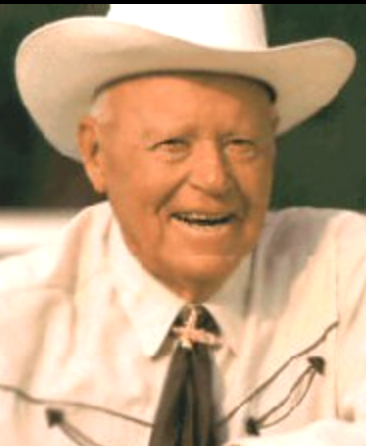On this date in 1909, John Richard “Jack” Simplot, Idaho potato baron, was born in Dubuque, Iowa. When he died at age 99, he was the Gem State’s most famous billionaire and, very likely its only atheist billionaire, with an estimated net worth close to $4 billion. In 2001, seven years before he died, he told Esquire magazine, “You’re dead, that’s the end of you. There’s no tomorrow.”
As a child he moved with his family to south-central Idaho. “It was a hard, crude life, reported the Idaho Statesman, profiling Simplot. “When young J.R. lost a fingertip in an accident and a doctor in Burley admonished his parents for not bringing it to be reattached, they told him the chickens had eaten it.”
Chafing under the rule of his authoritarian father, who was an atheist, Simplot quit school and struck out on his own at age 14. The Statesman told how he got started: “With money he made raising orphaned lambs, he purchased interest-bearing scrip at 50 cents on the dollar from teachers living at the hotel and used it as collateral to buy 600 hogs. He got them through the winter by shooting wild horses and boiling their meat with potato scraps to make feed. The summer brought a nationwide pork shortage, and he sold the hogs for a $7,800 profit, which became his stake in the potato business.
An innovator from the start, he leased land and bought certified seed instead of using the common practice of planting potato culls. The J.R. Simplot Co. was the nation’s largest shipper of fresh potatoes in World War II. But it was frozen french fries that made him a billionaire, a process Simplot patented in 1953. In 1967 he and McDonald’s founder Ray Kroc agreed with a handshake that Simplot would supply McDonald’s with fries. By 2005, Simplot supplied more than half of all fries for all the McDonald’s restaurants.
“Compared with him, the rest of the world was wearing bifocals,” Idaho Gov. C.E. “Butch” Otter said in 2008. (For a time, Otter was married to Simplot’s daughter Gay.) Simplot was plain-spoken and at times profane. (He told Esquire: “I’m a happy guy. I learned to leave the goddamn liquor behind. … I never choose sides in politics. That’s bullshit. I have to get along with whoever gets in.”) The license plate on his Lincoln Town Car said MR SPUD. Almost 30,000 people worked for companies Simplot founded or financed.
Simplot angered environmentalists for his support in the 1970s for building coal-fired power plants along the Snake River and generating hydropower by putting the North Fork of the Payette River in an underground tube. “He and his company have not been environmental stewards for Idaho’s lands and waters,” said Pat Ford, a former director of the Idaho Conservation League. “They were consistent opponents of efforts to strengthen Idaho’s air quality and land-use laws. And more often than not, they won.”
He also had some problems with the government after World War II and was hit by a $2.5 million tax bill and an order to dismantle partnerships that the Internal Revenue Service judged to be tax dodges. “A generation later, Simplot was charged with trying to manipulate Maine potato futures, barred from commodities trading for six years and fined $50,000,” the Statesman reported. “In 1977, he and his company paid $40,000 each for failing to report more than $1 million in corporate income and claiming false tax deductions.” He lost his right to vote due to the felony conviction but continued to extol America and free enterprise.
Simplot retired as company president in 1973 but remained as chairman until 1994. He died at home at age 99, with his second wife at his side, after a bout of pneumonia from which he appeared to be recovering. His death occurred moments after he had invited a friend to his home to play cards. Gin rummy was his game.
Simplot often wore an off-white cowboy hat that was part of his signature look. It was included as part of a floral arrangement and was stolen during his memorial service at Qwest Arena. It took nine months for the thief to return it, a week after a newspaper columnist pleaded for its return. Why would someone steal J.R. Simplot’s hat? “Stupidity,” the anonymous caller to the newspaper said. “It was one of those stupid, impulsive acts and was almost instantly regretted.” (D. 2008)


